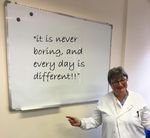AvantiCell Science celebrates British Science Week 2018
←
→
Page content transcription
If your browser does not render page correctly, please read the page content below
AvantiCell Science celebrates British Science Week 2018
To celebrate British Science Week 2018, we spoke to some of our staff about their careers in science
from 30+ years of experience to just starting out.
Kay Ferguson, Senior Scientist, has worked for the company from day one and is part of AvantiCell’s
Cell Isolation Team. Due to Kay’s extensive scientific background, we asked what made her pursue a career
in science.
“I wanted to be a forensic scientist, that is really common ambition now, but in the 1970’s it was
really unusual. There were no forensic science courses then. You had to get a biology or chemistry degree
so that is what I did or what I applied for. I turned out to be really good at zoology so ended up with a
zoology degree. When I graduated, the Forensic Science service wanted Chemists, not Biologists, so I
decided to do a PhD. That was in cellular parasitology.
After that I applied for interesting post-doctoral research jobs in related fields and ended up in
several interesting roles. I have worked in two different universities and then in an Agricultural Research
Institute run by the Scottish Government and now I work in a biotechnology company specialising in
primary cell culture and assays.
The career I have had has been varied, working on; protozoan parasites attachment in their host,
isolated cell skeleton protein structure, regulatory proteins of milk production in various animals
(humans, wallabies, and dairy animals), cell biology of lameness in cattle, mammary cancer regulation
and now I isolate primary cells from human tissues and develop assays using these cells. All these varied
topics have had a related theme of cell culture and using microscopy techniques as a speciality.
So, the answer to the initial question is that I was interested in science at school and had a plan,
but my plan went awry, and I have ended up in a varied cell biological career. I suppose my career
illustrates that cell biologists have varied degree backgrounds and can work on many different subjects,
it is never boring, and every day is different!!”
AvantiCell know the importance of celebrating scientific successes, no matter what field! And that’s why we
asked Erin Sutherland, one of our Graduate Scientists, who celebrated her one-year anniversary with the
company in recent weeks, what she has found to be the most rewarding aspect of her scientific career so far.
“During my years in science, I have found the most rewarding aspect of my career to be when all
the hard work has paid off and your data is published in a scientific journal. This makes all the stress
and hard work worth it, and it inspires you to keep pushing forward in your career.
© AvantiCell Science 2018. All rights reserved.Following my time at Glasgow University, it was lovely to see all the figures and data that we
had gathered published in the PLOS One and Nature journals. This was very rewarding - to know that the
work you have produced is out there for the world to see, to hopefully benefit other scientists and help with
further research.”
Research is key to the ever-evolving world of science and AvantiCell is committed to helping early stage
researchers start out in their careers by working with students involved in the Marie Sklodowska-Curie
Actions (MSCA) Innovative Training Network (ITN) funded by the European Union under the Horizon2020
Framework. We have been a successful industrial beneficiary in many of these projects, with 3 actively
running within the AvantiCell lab. Applications are now open for a fourth MSCA project – EuroNeuroTrophin.
To find out more about the project, click here.
One of our PhD students, Florian, who is working on the Chromatin 3D Project, has been developing novel
cell-based models to improve preclinical anti-cancer drug testing. Currently, over 90% of all new anti-cancer
drug candidates fail clinical trials, which makes the search for a cure lengthy and costly. Florian combines
leading-edge 3D cell culture techniques, like bioprinting, to build 3D models that more closely reflect the cell
microenvironment than conventional anti-cancer screening methods which, in time, will lead to more
efficient drugs, faster. Click the image below to watch his breast cancer cells within a 3D scaffold on our
YouTube channel.
They’ve been stained with DAPI and Phalloidin to give the beautiful blue and red colours.
© AvantiCell Science 2018. All rights reserved.And finally, please meet Alessandra Prinelli who is working through her second year of study on the Pandora
MSCA ITN project, focused on the effects of nanoparticles on the human immune system. Alessandra has
had a very successful first year with AvantiCell. She was asked what she hoped to achieve during her
scientific career.
“Over recent years, I have been working towards a doctorate degree in scientific research with the
ultimate goal to progress my research career within a biotechnology company. I would also like to develop
in the areas of management and leadership and build a network of scientific and non-scientific
collaborations, with the aim to contribute to interdisciplinary and translational research.
My aspiration for the future is to be actively involved in the progression of science, working
towards bringing benefits to society, with special regard to medical benefits, that will better everyday life.
My future is open, and I am keen to explore the wide range of career possibilities that will arise after the
extensive training and tutoring provided by the Pandora Project.”
We hope you enjoyed learning more about some of our scientific staff as much as we enjoyed taking part in
British Science Week 2018. It’s the perfect excuse to celebrate science and we’ll be back celebrating next
year. Keep up-to-date with us until then by following us on Twitter, Facebook and LinkedIn.
© AvantiCell Science 2018. All rights reserved.You can also read





















































